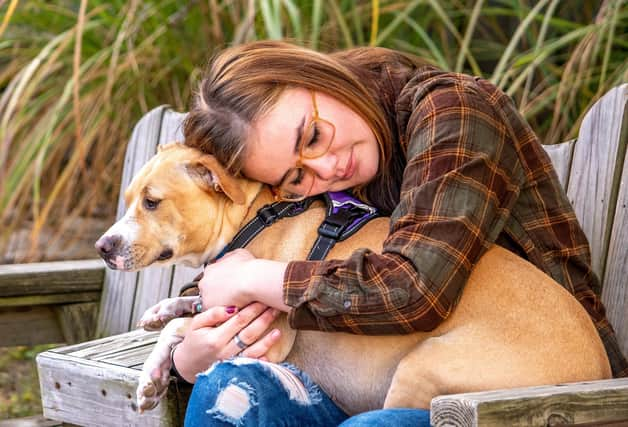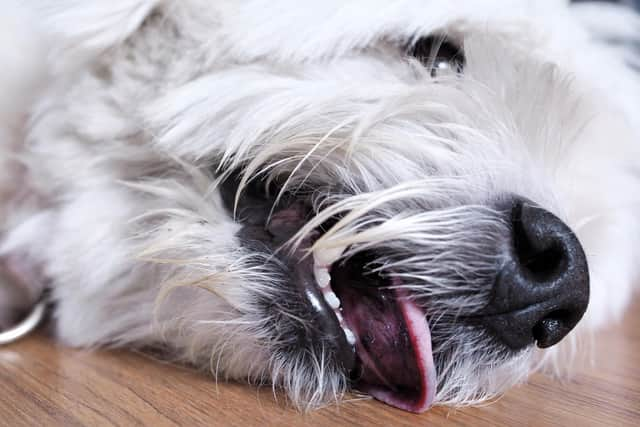Dogs and how to deal with epilepsy conditions
This article contains affiliate links. We may earn a small commission on items purchased through this article, but that does not affect our editorial judgement.


She added: “It can be really scary to witness your pet having a seizure, especially if it’s for the first time, but it’s important not to panic and to stay calm. They usually only last for a few minutes and your dog is very unlikely to know what is happening.
“If your dog is having a seizure, follow our first aid advice and contact your vet if they’re having a seizure for more than one minute.”
Advertisement
Hide AdAdvertisement
Hide AdDon’t panic – Don’t go near your dog’s mouth - they may accidentally bite.


If they are high on up a sofa or staircase, move them to a safe area. Turn the lights off and make the room as quiet as possible
Time the seizure – make a note of how long it lasts.
Phone your vet for advice – Avoid transporting your dog until the seizure has stopped (unless your vet advises otherwise).
Before a seizure your dog’s behaviour may change – they may become vacant, unsteady or agitated.
Advertisement
Hide AdAdvertisement
Hide AdWhen the seizure starts, it can range from slight muscle twitching in one part of the head or body, known as a partial seizure, to a whole body seizure. Symptoms of this include loss of consciousness, falling over, foaming at the mouth, chewing and muscle spasms.
Once the seizure has passed, your dog will start to come round and recognise you again. Some dogs return to normal very quickly, and some take a few hours to get back to being themselves. The gap between seizures can vary from just a few minutes to many months or even years. If your dog has another seizure straightaway, this is known as a cluster seizure and means your vet should be called immediately.
Unfortunately, epilepsy can’t be cured but can usually be managed with medication. It’s important to note that a one-off seizure does not necessarily mean that your dog has epilepsy, there are other causes of seizures and they sometimes go unexplained.
Before starting treatment for epilepsy, your vet will want to make sure there is nothing else that could be causing your dog to have fits. They may want to run some tests on blood, urine or send your dog for an MRI scan. If medication is needed, epilepsy is often treated using medicines called anticonvulsants. Anticonvulsants stabilise the brain to reduce the chance and severity of a seizure. In many cases they are very effective and sometimes they stop seizures altogether. Once your dog is on anticonvulsants, your vet may want to run blood tests from time-to-time to make sure that everything is OK. (photos: Adobe)
Advertisement
Hide AdAdvertisement
Hide AdMore expert advice on how to look after your pet
Dear PDSA vet, my dog Charlie had a seizure a few weeks ago, it only lasted a minute or so and then he came round. I’m worried it might happen again and what to do if it does/ Do you have any advice? Josie
Hi Josie, it’s scary to witness your pet having a seizure, but it’s important not to panic and be calm. They usually last under a minute but we’d always recommend calling your vet. If Charlie has another seizure, make sure he’s safe, only move him if he’s in danger or likely to harm himself. It’s important not to touch or go near Charlie’s mouth as he may accidentally bite you. Turn lights off and make the room as quiet as possible. Once a seizure has passed, Charlie may seem dazed at first, most dogs return to normal quickly, but some take a few hours to get back to being themselves. The gap between seizures can vary from just a few minutes to many months or even years. If your dog has another seizure straightaway, this is known as a cluster seizure and means you should call your vet immediately. For more information visit www.pdsa.org.uk/epilepsy website.
Dear PDSA vet, my sister’s cat Oscar has moved in with us but seems to have upset or got off on the wrong foot with my cat Smudge. How can I help them get along? Amber
Hi Amber, introducing another cat to a home where there is an established cat can be difficult, but there are ways to make it easier. Smudge is now expected to share his ‘space’ with Oscar, which can be very stressful for both and could make them unwell if things aren’t put in place to calm the situation. Go back to basics, separating them for a while and reintroducing them slowly. Make sure both cats have their own - plus one extra - bed, water station, feeding station, litter tray and scratching post. Space them out around the house, making sure they’re not in corners or corridors where a cat could easily be "ambushed" by another. For further advice visit www.pdsa.org.uk/cat-fights website.
Advertisement
Hide AdAdvertisement
Hide AdDear PDSA vet, my puppy Rupert is ready to start meeting other dogs after having his injections. We have lots of dogs in the wider family so should I arrange a meet up for them all at the same time or spread it out? Harriet
Hi Harriet, socialisation is really important for your puppy as it helps them to become a happy, friendly and confident adult. The first four months of his life are his ‘socialisation period’ and it’s vital that during this time he has different, positive new experiences that helps him understand what to expect, and how to react later on in life. When arranging a puppy play date, take introductions slowly. Don’t overwhelm him and introduce one family dog at a time.